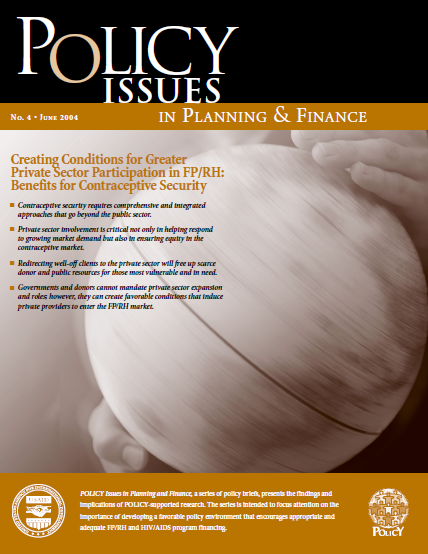
Resource Library
Creating Conditions for Greater Private Sector Participation in FP/RH: Benefits for Contraceptive Security
Private sector involvement is crucial not only in helping respond to growing market demand but also in expanding consumer choices and ensuring equity in the contraceptive market. Evidence from many countries shows that the nonpoor benefit disproportionately from free and subsidized public sector services and commodities (Winfrey et al., 2000). A recent analysis of 10 donor-dependent countries reveals that 45 percent of pills and 56 percent of condoms supplied, respectively, by the public sector and social marketing initiatives went to those who could otherwise afford to pay for them (Sine, 2002). Redirecting wealthier/middle-income clients to the private sector will free up scarce donor and public resources for those most vulnerable and in need. A recent market segmentation study in the Philippines shows that shifting middle- and high-income users of government services to the private sector would reduce the burden on the public sector by more than 40 percent (Alano et al., 2002). It is important to recognize that more than one-third of all family planning users in the developing world already obtain contraceptives from the private sector (Rosen and Conly, 1999). In countries such as Cameroon, Colombia, the Dominican Republic, Ghana, and Jordan, more than 60 percent of users obtain their contraceptives from private rather than public sources (Ross et al., 1999). Given that the private sector in many countries is already a major player in the contraceptive market, any feasible contraceptive security plan needs to take into consideration the private sector's current and potential role. This policy brief provides an overview of processes, strategies, and tools that developing countries can adopt to foster complementary public/private sector roles that enhance the private sector's contribution to contraceptive security. Specifically, the brief examines the roles of the public and private sectors in the provision of contraceptives and condoms; and describes strategies/mechanisms used at both the policy and operational levels to mobilize the private sector.
Resource Type : Other
Country : Dominican Republic, Ghana, Jordan, Philippines
Year : 2004-06-01T16:30:00
Language : English
Project : SHOPS


